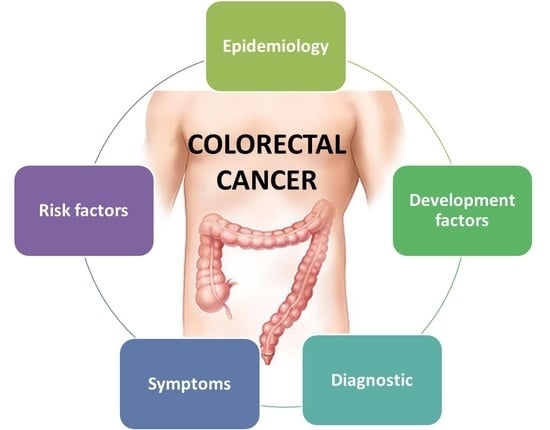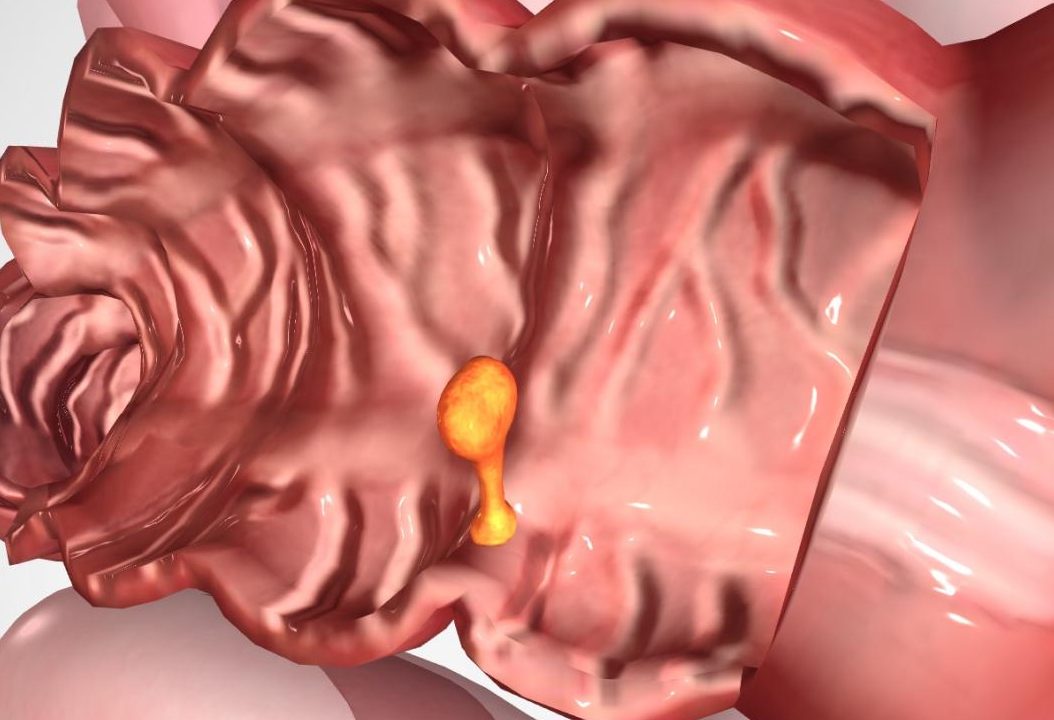Polyps in the colon are growths that develop on the inner lining of the large intestine. They are usually benign but can sometimes become cancerous.
Colon polyps vary in size and shape and are common among adults. Although they often present no symptoms, some individuals may experience signs such as rectal bleeding, irregular bowel movements, or abdominal discomfort. Regular screening, especially for those over 50 or with a family history of polyps or colorectal cancer, is crucial for early detection and removal of polyps, reducing the risk of progression to cancer.
Healthy lifestyle choices, including a diet rich in fruits, vegetables, and fibers and low in red meat, can also help prevent their formation. It’s important to consult with a healthcare professional if you experience symptoms or have concerns about colon polyps.
:max_bytes(150000):strip_icc()/ulcerative-colitis-and-colon-cancer-5204560_FINAL-3ebdae59ed1f4c88a4c1ab0153f127e8.jpg)
Credit: www.verywellhealth.com
What Are Polyps?
A polyp is a small clump of cells that forms on the lining of the colon. Over time, some polyps can develop into cancer. Polyps are found in the colon, also known as the large intestine. Not all polyps are dangerous, but it’s important to remove them when they are found. Detecting them early is key to prevention.
Types Of Polyps
Several types of polyps can grow in the colon:
- Adenomatous: These polyps sometimes change into cancer. Because of this risk, they are called a pre-cancerous condition.
- Hyperplastic: Generally not pre-cancerous, these are more common. They are typically found in the left colon and rectum.
- Inflammatory: Often resulting from ulcerative colitis or Crohn’s disease, these polyps may resemble cancerous growths.
Causes And Risk Factors
Polyps form when gene mutations cause cells to grow continuously. Certain factors increase the risk:
| Risk Factor | Details |
|---|---|
| Age | Over 50 years old |
| Lifestyle | Smoking, alcohol, less activity |
| Diet | High-fat, low-fiber, red meat |
| Family History | Relatives with polyps or colon cancer |
| Health Conditions | Obesity, diabetes, inflammatory intestinal conditions |
Regular screenings help identify polyps early. Diet and lifestyle changes can help lower risk. Removing polyps can prevent the development of cancer.
Signs And Symptoms
Understanding the signs and symptoms of polyps in the colon is key to early detection. Polyps are growths on the inner lining of the colon which can develop into cancer. Most people with polyps do not experience symptoms until they become large or develop into cancer. Recognizing the potential indications can lead to timely medical advice and intervention.
Common Symptoms
- Rectal bleeding: Bright red blood on the toilet paper or in the bowl.
- Iron deficiency anemia: Unexplained fatigue or weakness due to blood loss.
- Change in bowel habits: New constipation or diarrhea that lasts more than a week.
- Abdominal pain: Cramps or pain due to obstructed bowel movements.
- Blood in the stool: Darker blood mixed with stool, a sign of bleeding inside.
Complications
| Complication | Description |
|---|---|
| Colorectal cancer | Polyps can develop into cancer over time. |
| Bowel obstruction | Large polyps can block the intestine, needing urgent care. |
| Intestinal bleeding | Continuous blood loss from polyps can be harmful. |
Diagnosis
Spotting polyps in your colon early is vital. A doctor starts with tests to peek inside your body.
Screening Tests
A colonoscopy is a common test. Doctors use a thin tube to see your colon. This test finds polyps and cancer.
An at-home test looks for hidden blood. You use a kit and send it back. Polyps can cause bleeding, which this test can catch.
A virtual colonoscopy uses X-rays. You don’t need a tube for this. But, if polyps show up, you’ll need a regular colonoscopy after.
A sigmoidoscopy is like a colonoscopy. But it checks only the lower part of your colon.
Diagnostic Procedures
Finding polyps requires a closer look. The next step often involves:
- Biopsy: Snipping pieces of a polyp. A lab checks the sample for cancer cells.
- Imaging tests: CT scans or MRIs can spot polyps. You lie in a machine, and it takes pictures of your insides.
Doctors might use a blood test. It can show how your liver works and if there are cancer markers.

Credit: www.okddsi.net Find Anti Colon Cancer Products ☚
Treatment Options
Exploring treatment options for polyps in the colon is crucial. Good news awaits! Treatments are effective and can prevent complications. Let’s delve into the two main approaches: polypectomy and surgical intervention. These methods aim to remove polyps and safeguard colon health.
Polypectomy
A polypectomy is a non-invasive procedure. Doctors do this during a colonoscopy. It involves snipping the polyps. No need for cuts on the belly.
- Simple and quick: The process usually takes minutes.
- Recovery is fast: Most people go home the same day.
- Prevents cancer: Removing polyps can stop cancer before it starts.
Surgical Intervention
Sometimes, a polypectomy is not enough. Large or numerous polyps might require surgery. The goal is to remove large polyps or those that cannot be reached safely during a colonoscopy.
| Type of Surgery | Features |
|---|---|
| Laparoscopic surgery | Making small incisions and using special tools. |
| Open surgery | Needed for larger areas; involves a larger cut. |
- Surgeon evaluates the best method.
- Post-operative care ensures recovery.
- Follow-up checks watch for new polyps.
Prevention And Outlook
The journey towards colon health involves proactive steps to prevent the development of polyps. Understanding how to steer clear of potential issues and manage risks contributes to a more positive outlook. Let’s explore how lifestyle changes and diligent follow-up care can play pivotal roles.
Lifestyle Changes
Making smart choices daily can significantly reduce polyp formation risks. A healthy colon starts with a healthy lifestyle.
- Eat plenty of fruits and vegetables: A diet high in fiber supports colon health.
- Limited red meat consumption: Studies suggest red meat can increase polyp risk.
- Exercise regularly: Regular activity helps maintain a healthy weight, cutting polyp risks.
- Avoid smoking and limit alcohol: Toxins from both affect colon well-being.
- Control inflammation: An anti-inflammatory diet may prevent polyp growth.
Consistent, positive choices lay the foundation for a polyp-free colon.
Follow-up Care
Regular screenings and doctor visits are crucial in maintaining a polyp-free colon.
- Colonoscopies: Essential for detecting and removing polyps early.
- Medical consultations: Comprehensive updates on colon health status.
- Adherence to screening schedules: Tailored to individual risk factors.
Attentive follow-up care helps in identifying issues early and maintaining colon health.

Credit: www.mdpi.com
Frequently Asked Questions For Polyps In Colon
What Are The Symptoms Of Colon Polyps?
Polyps in the colon often present no symptoms. However, when they do, the most common signs include rectal bleeding, changes in stool color or shape, and abdominal discomfort. Regular screening is the best prevention method.
Can Diet Influence Colon Polyp Formation?
Yes, diet can impact the formation of colon polyps. Diets high in red meats and processed foods may increase risk, while those rich in fruits, vegetables, and fibers can potentially reduce it. It is advisable to maintain a balanced diet for colon health.
How Often Should You Screen For Polyps?
Screening frequency for colon polyps typically depends on individual risk factors. Most health guidelines suggest beginning screening at age 50 for average risk individuals, with a follow-up every 10 years if no polyps are found. Consult a healthcare provider for personal recommendations.
Are Colon Polyps Cancerous?
Most colon polyps are benign, but some can develop into cancer over time. Adenomatous polyps carry a higher risk of becoming cancerous. Regular screening can help in detecting and removing polyps before they turn into cancer.
Conclusion
Understanding the signs and implications of colon polyps is essential for maintaining good digestive health. By staying informed and proactive, we can effectively reduce risks of complications. Regular screenings and healthy lifestyle choices are our best defenses in preventing the progression of these growths.
Let’s prioritize our colon health today.

